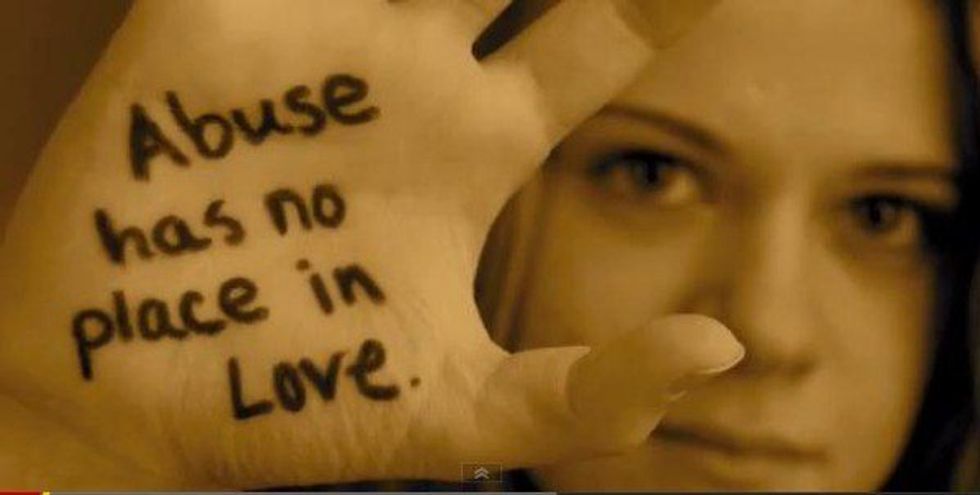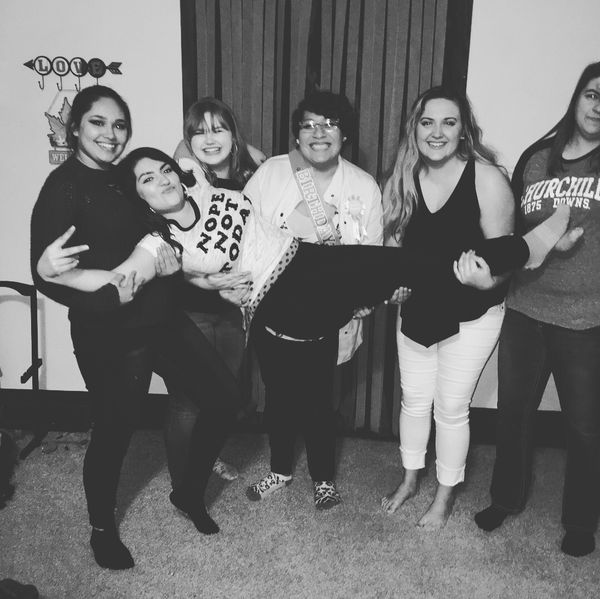I am eternally grateful to survivors of abusive relationships for speaking out against their abusers and bringing awareness to the signs of abusive relationships. But there is always more that can be done. In my experience, when people hear the term "abusive relationship," they only think of physical abuse, but abusive relationships can be so much more. I ended an abusive relationship almost four years ago and can attest to the fact that the effects of this relationship have still not completely gone away. Many times I don't feel that I "deserve" to say that I was in an abusive relationship in the first place because of the lack of knowledge of the different types of abuse. Using my own personal experiences and information from loveisrespect.org, here are the types of abuse found in abusive relationships that we often don’t talk about:
1. Physical Abuse
This type of abuse is most recognizable and can include any type of unwanted physical contact. Physical abuse does not always cause pain or markings but is still unhealthy. Signs of this type of abuse can include:
- Scratching, punching, biting, or kicking you
- Throwing objects at you
- Pulling your hair or clothing
- Using a weapon of any kind against you
- Forcing sexual acts
- Grabbing your face or body to draw attention or keep you from leaving
I was fortunate to not experience physical abuse in my relationship, yet I often witnessed his physical aggression towards inanimate objects, such as punching a wall or kicking an object across the room, which qualifies as emotional/verbal abuse.
2. Emotional/Verbal Abuse
This type of abuse can include any non-physical behaviors meant to assert emotional and mental dominance. There are several behaviors that can be identified as emotional/verbal abuse, including:
- Calling you names and putting you down
- Yelling and screaming at you
- Embarrassing you in public
- Monitoring your contact with others including friends and family
- Monitoring your physical appearance, such as clothing, hair styles, and makeup
- Damaging your property when angry
- Using social media or cellphones to control, demean, or insult you
- Blaming their abusive behavior on your actions
- Accusing you of cheating or exhibiting excessive jealousy
- Stalking
- Threatening to commit suicide to keep you in the relationship
- Threatening to harm you, your pets, or your family
- Making you feel guilty for not consenting to sexual acts
- Threatening to expose your secrets
- Starting rumors about you
This was the most common form of abuse I encountered in my relationship. There was a lot of yelling to demean and control, monitoring my contact with certain friends, monitoring my physical appearance, damaging my property when angry, blaming his behaviors on me, threatening to commit suicide if I broke up with him, and threatening to expose my secrets. Because of this, I always lived in fear of what would happen if we broke up, despite my unhappiness in the relationship. He kept me from dating others throughout high school, including my current boyfriend. I was also hesitant to leave the relationship because he made me feel as if I was unworthy of anyone else’s love.
3. Sexual Abuse
Like physical abuse, this type of abuse involves any unwanted physical contact by means of sexual pressure or coercion. A common misconception of sexual abuse is that if the victim does not resist or does not say no, it does not count as abuse. Some examples of sexual abuse can include:
- Unwanted kissing or sexual touching
- Unwanted, violent sexual activity
- Rape or attempted rape
- Refusing to use condoms and/or restricting use of birth control
- Keeping you from protecting yourself against STIs
- Sexual contact with you when you are drugged, drunk, unconscious, or otherwise unable to give consent
- Threatening you into unwanted sexual contact
- Pressuring or forcing sexual contact
- Using sexual insults
Much of the time, people experiencing sexual abuse in their relationship don’t believe themselves to be abused because they are dating their abuser and have consented to sex in the past. This is simply not true. If your partner berates you into having sex or makes you feel guilty for not consenting to sex, it is considered sexual abuse. If you do not consent to sex or any sexual act, it is sexual abuse. In my relationship, my partner pressured me into having sex by making me feel guilty for not wanting to.
4. Financial Abuse
- Financial abuse is a much more subtle form of abuse and can entail:
- Giving you an allowance and closely watching your purchases
- Forbidding you to work or limiting the amount you work
- Preventing you from going to work
- Getting you fired by stalking or harassing you
- Hiding or stealing paychecks or other forms of financial support
- Using your social security number or the number of a family member
- Maxing out credit cards
- Refusing to give you money for food, rent, or other expenses
- Spending money on themselves, but forbidding you to do the same
- Using their money to assert power over you
When we were dating, I did not have the financial means that my boyfriend had. Because of this, he decided if and when we went on dates and where we went. When I got a job and a car, he expressed displeasure with this fact because he enjoyed that I relied on him for transportation. The day I got my driver’s license and my own car caused an enormous argument between us. Besides this fact, there was not much he did to control me financially.
5. Digital Abuse
Digital abuse is another common form of abuse that often goes unrecognized. This type of abuse can include:
- Telling you whom you can and can’t be friends with on social media sites
- Sending you negative or threatening messages
- Using social media to keep tabs on you
- Cyberbullies you (including name calling, put-downs, and harassment)
- Sends or solicits unwanted, explicit pictures or videos
- Steals or demands social media site passwords
- Constant or repetitive texts/calls
- Looks through your phone and/or gets defensive if you refuse
This type of abuse is becoming more common as social media becomes more integrated into our lives. In my relationship, my partner would repeatedly text and call me and make me feel guilty if I didn’t respond. He would often want to look through my phone to make sure I wasn’t texting anyone he didn’t like or to make sure I wasn’t cheating on him. When I refused, he would accuse me of hiding something. While attempting to break up with him, he would constantly call me to try to talk me out of it or text me negative and demeaning comments.
6. Stalking
While stalking is an aspect of emotional/verbal abuse, it can often involve several different aspects including:
- Showing up at your work or home unannounced or uninvited
- Sending you unwanted text messages, letters, emails, or voicemails
- Leaving unwanted items, gifts, or flowers
- Constantly calling and hanging up
- Using social media sites to track you
- Spreading rumors about you among friends and on social media sites
- Calling your employer, friends, or family
- Waiting at places you frequent
- Using other people as resources to find you or find out information about you
- Damaging you home, car, or property
While I didn’t realize it at first, my boyfriend exhibited many signs of stalking including showing up to my house several times unannounced and uninvited. He even knew the code to our back door’s lock. After we had broken up, I found a note from him on my pillow letting me know that he had been there when my family and I were not home.
It took me several years to realize how abusive this relationship was and how it was negatively affecting my mental health. I am so grateful that I spoke up and reached out to my school psychologist, or else I would never have had the courage to break up with him. I regret that we never got a chance to reconcile and have closure in our relationship. The last conversation we ever had was hurtful and argumentative. I find myself fearful of running into him every time I go home. While I do not harbor any negative feelings for him, I do resent the psychological and emotional damage I still carry with me to this day.
If you are in a relationship and notice your partner exhibiting any of these signs, please seek counseling. If a friend or family member is in a relationship with a partner exhibiting these signs, don’t be afraid to address the situation. While they may be in denial and may get angry with you for suggesting they are in an abusive relationship, much of the time it is because they already know. If a loved one comes to you in fear that they are in an abusive relationship, believe them. Listen. Be supportive. Be there for them. Don’t let them get into a situation where it is too late to help. And please don’t forget that abuse can happen in a variety of relationships to a variety of people; they do not only occur with a male perpetrator and a female victim. For more information on abusive relationships and how to address them, visit http://loveisrespect.org.





















